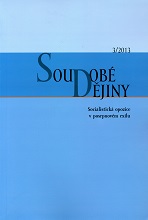Zdeněk Mlynář a hledání socialistické opozice. Od aktivní politiky přes disent k ediční činnosti v exilu
Zdeněk Mlynář and the Search for a Socialist Opposition: From Active Politician to Dissident to Editorial Work in Exile
Author(s): Alessandro CatalanoSubject(s): History
Published by: AV ČR - Akademie věd České republiky - Ústav pro soudobé dějiny
Summary/Abstract: This essay was originally published as ‘Il samizdat tra dialogo e monologo: Le attività editoriali di Zdeněk Mlynář e la scelta degli interlocutori’ in the Italian online journal eSamizdat: Rivista di culture dei paesi slavi (2010–11, pp. 261–80). This double issue is based on papers given at the conference ‘Samizdat between Memory and Utopia: Independent Culture in Czechoslovakia and the Soviet Union in the Second Half of the Twentieth Century’, which was held at Padua University in late May and early June 2011, and is freely accessible on the periodical website (http://www.esamizdat. it/rivista/2010-2011/index.htm). For its publication in Soudobé dějiny, the author has considerably expanded his essay, particularly after doing research in the Mlynář Papers at the National Archive, Prague. The author concentrates mainly on the research and publishing activities of the politician and political scientist Zdeněk Mlynář (1930–1997) while he was in exile, which he puts into a detailed chronology of his career as a public figure. He asks. and seeks to answer, the general question whether the milieu of samizdat and independent publishing, which developed in Czechoslovakia in the 1970s and 1980s, did not leave deep traces also in the structures of the various political activities of those who criticized the state-sanctioned arts and sciences of ‘Normalization’ Czechoslovakia. The author points out that Mlynář has today been largely ousted from Czech historical memory, even though he was amongst the leading opponents of the Communist régime after its collapse, and tried to regain a place in Czechoslovak politics. The author recalls Mlynář’s becoming a member of the Czechoslovak Communist Party early on, his law studies in Moscow in the first half of the 1950s, where he formed a lasting friendship with his fellow-student Mikhail Gorbachev (b. 1931), as an expert researching the prospects of the socialist political system in the 1960s. He then concentrates on Mlynář’s work during the Prague Spring of 1968, when he became a member of the reformist leadership of the Communist Party at the side of Alexander Dubček (1921–1992). After the August intervention by armies of five Warsaw Pact states, Mlynář gradually became disillusioned with the possibilities of continuing reform, and he resigned from the Party leadership. In the early 1970s, he found employment in the Department of Entomology at the National Museum, Prague, and avoided political life. Nevertheless, he gradually joined in debates with other reformists expelled from the Party about the possibilities of influencing developments in Czechoslovakia with the help of leftwing parties in western Europe. The author discusses Mlynář’s analyses of the situation at the time, the development of his views, and his integration into the nascent dissident movement, which appeared after the founding of Charter 77.
Journal: Soudobé Dějiny
- Issue Year: XX/2013
- Issue No: 03
- Page Range: 277-344
- Page Count: 68
- Language: Czech

